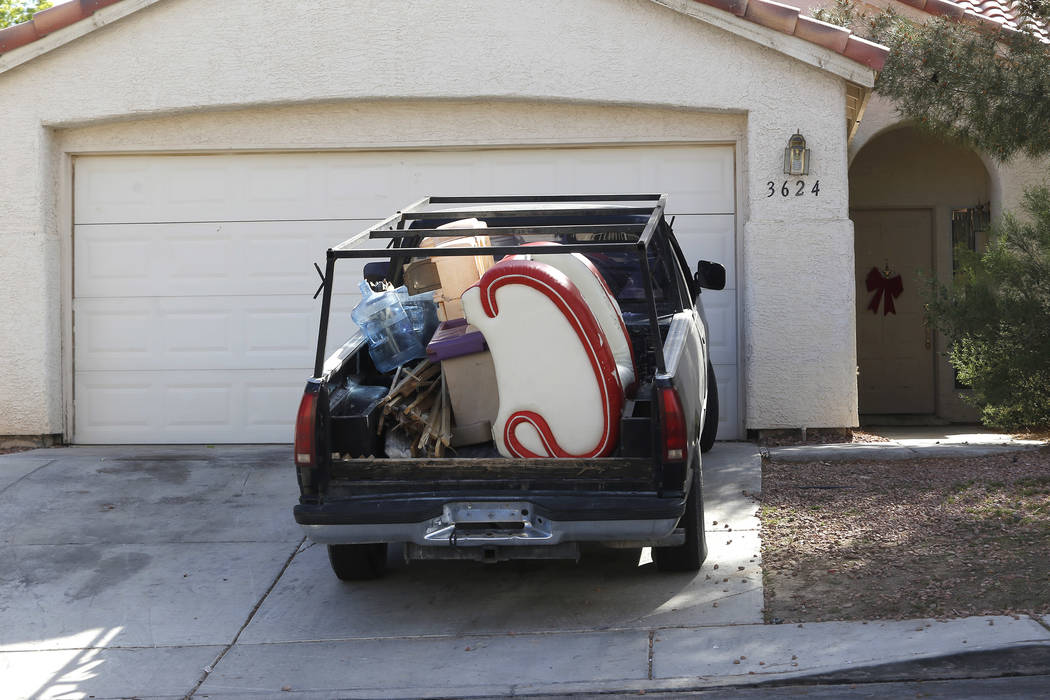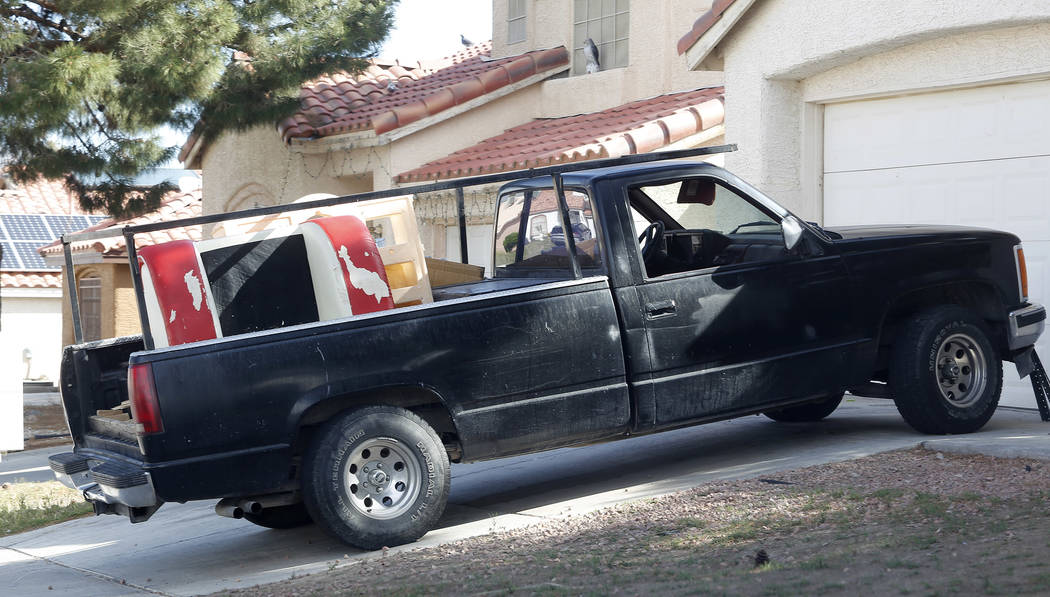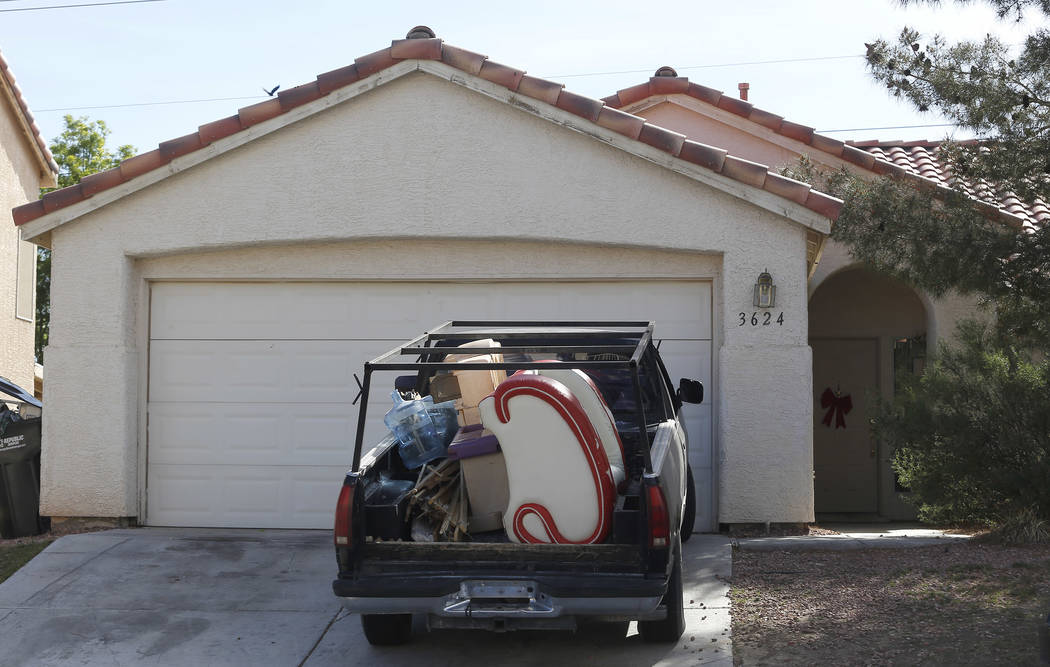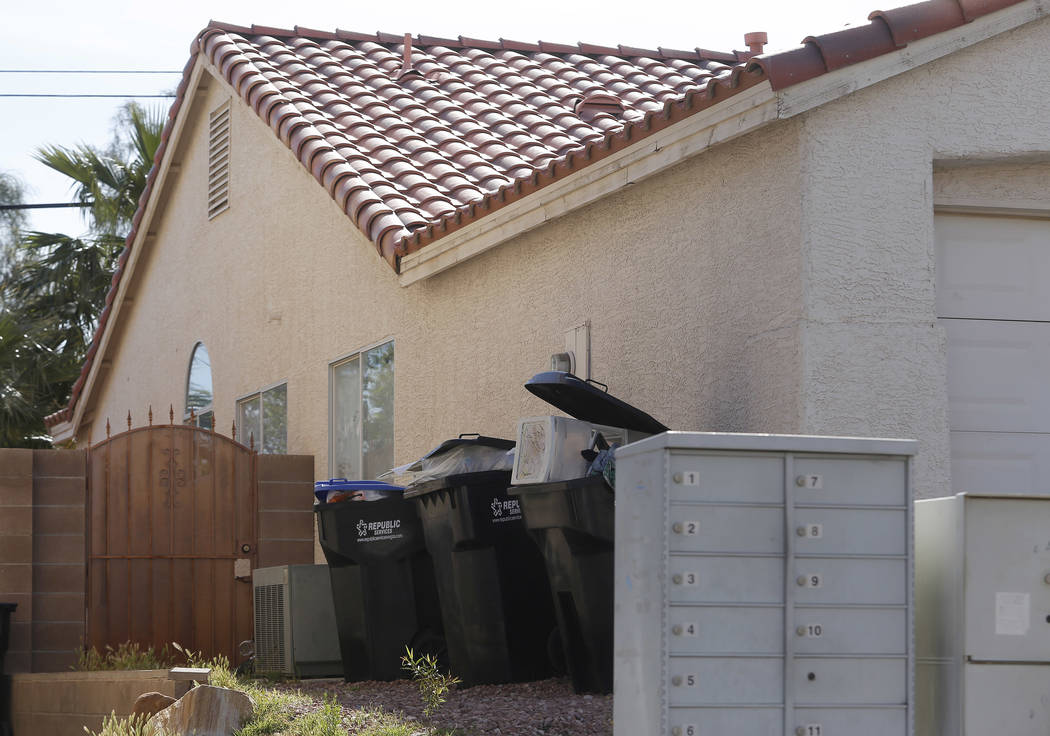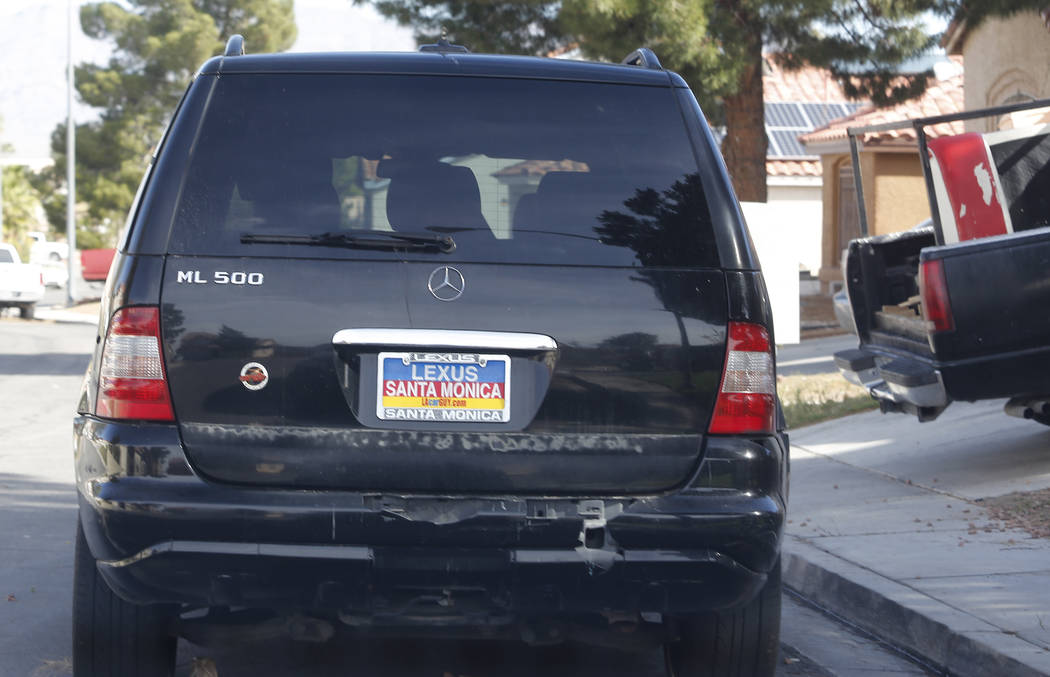Easy access to utilities helps Las Vegas squatters
The windows are boarded-up, the side gate is padlocked, and all is quiet inside. But not long ago, neighbors say, the Las Vegas house was buzzing with squatters.
Neighbors saw shopping carts full of belongings at the abandoned home off Charleston and Jones boulevards. They saw random people come and go and heard fighting at the house, and workers picked up garbage, needles and all, that the newcomers had dumped in a nearby alley.
And, neighbors noticed, the lights were on inside the house.
“Apparently anybody can turn the power on,” a neighbor said. “That’s what the cops said.”
Despite its improved housing market, Las Vegas has grappled with a widespread squatter problem in recent years, enabled by the region’s thousands of vacant homes and extensive use of fake leases. 1st Realty Group owner Thomas Blanchard, who specializes in distressed homes, said it’s “more often than not” that such houses have at least some utilities working.
“I’m sort of jaded because it happens so often,” he said. “It’s just part of the game.”
Easy utility access didn’t cause Las Vegas’ squatter problem, and even if providers could prevent illegal occupants from turning service on, that alone wouldn’t solve it.
But switching on the utilities can only help squatters get more comfortable in other people’s homes.
Clark County Commissioner Chris Giunchigliani, who says her district “has a lot of squatters,” asked county staff in February to find out how utility providers verify who is turning service on. About a year ago, a neighbor told her that someone had switched on the power in a long-vacant house in her district.
The staff’s findings?
“Basically, nobody really verifies anything,” Giunchigliani said.
‘Doesn’t make sense’
Power, water, cable, gas and trash providers require various information from customers, including name, date of birth and Social Security number, before starting service.
But it seems most, if not all, don’t force all customers from the get-go to prove they are the rightful owners or tenants. And when they do, it’s usually because of delinquent payments.
According to county staff’s findings, provided by Giunchigliani, NV Energy does not require proof of ownership or rental agreement “unless there is a documented issue” at the address, such as disconnected service for nonpayment.
Southwest Gas Corp. needs a lease only if there is a history of a “troubled account,” like an outstanding balance. Cox Communications does not require proof of ownership or a lease from its television, phone and internet customers because service “follows the individual,” not the address.
Giunchigliani last month wrote that it “doesn’t make sense” that someone can break into a house and call to set up utility service “without any proof” of ownership or rental status. This, she added, is a “loophole … that can easily be remedied.”
NV Energy verifies customers’ identity, but if they meet the guidelines to start service, the utility won’t turn them away, spokeswoman Jennifer Schuricht told the Review-Journal.
“We don’t question that they have a right to be at that address,” she said.
Southwest Gas spokeswoman Sonya Headen said that if “rightful homeowners” tell the utility that people are living illegally in a home, “the company has the right to refuse or discontinue service.”
Cox spokesman Juergen Barbusca said his company needs to ensure that potential customers can pay their bills, but it doesn’t verify whether they own or are renting their home.
CenturyLink requires customers to at least show a valid government ID, a utility bill with their name and address, “and/or” pay a deposit, spokesman Jason Chan said in an email. He did not say whether the broadband provider verifies ownership or rental status.
The Las Vegas Valley Water District in 2012 stopped requiring renters to furnish a lease. Squatters can simply forge one, spokesman Corey Enus said. If the agency learns that squatters are in a home, it “can’t necessarily disconnect service” if the bills are being paid. But property owners can transfer service to their own name and shut it off, he said.
Republic Services, meanwhile, requires a lease and move-in date if a customer is a renter, according to the county staff report, which did not say whether the trash hauler requires proof of ownership as well.
Company spokeswoman Tracy Skenandore did not comment for this story.
Las Vegas police Lt. Nick Farese of the suburban Northwest Area Command, which in recent years received the most squatter calls in the Metropolitan Police Department, said utilities are on “a good portion of the time” in such houses.
If squatters aren’t drawing attention and have running water and air-conditioning, they are “more likely to stay,” Farese said. But blocking them from turning service on won’t “make the problem go away” as homes without utilities still get squatters.
Also, it’s not “necessarily a negative” if they have utility service. It leaves a paper trail, and Farese said it helps him figure out “who’s on the other side of the door.”
“Do they always use their real name? No. But it helps,” he said.
Need a jump?
If squatters don’t call utility companies, they can get essential services other ways.
They reportedly have hauled buckets or jugs around to steal water from neighbors’ spigots; run extension cords to neighbors’ outside outlets; clamped jumper cables to the power box; accidentally set homes on fire when cooking or trying to stay warm; and used the backyard as a bathroom.
When investigating reports of power theft, NV Energy will take action “to make the situation safe,” including repair its equipment or disconnect the power, Schuricht said. If water district officials believe someone is stealing service, they can lock the meter to shut the water off, Enus said.
A recent report showed that 447 closed residential and commercial accounts – less than 1 percent of water district customers – had some sort of activity, he said.
Blanchard, of 1st Realty, recently sold a bank-owned home off Buffalo Drive and Robindale Road in the southwest valley. Inside, he had found cereal, a few cans of green beans, some plates and two sets of silverware that didn’t match, as well as a receipt for the items on the kitchen counter, dated just a few days before he visited.
Lenders foreclosed on the house in December. As of last month, the gas was shut off, but the power and water were on.
He also was hired about a year ago to sell a foreclosed home off Martin Luther King Boulevard and Gowan Road in North Las Vegas. The property, he says, is occupied by squatters.
They’ve showed him a flimsy-looking lease – the listed landlord wasn’t the real owner – and the house has had running water, power and gas.
‘Vast increases’
Las Vegas’ housing market is on steadier ground, but the valley still grapples with some lingering problems from the recession, including vacant homes, many of which were bought during the bubble years and faced foreclosure after the economy crashed.
There were about 13,900 empty homes in the Las Vegas area as of the third quarter of last year, according to housing tracker Attom Data Solutions. People have broken in and changed the locks, and stories abound of squatters paying someone for keys and a bogus lease and telling police or real estate agents that they found the house on Craigslist.
It’s all too common for squatter houses to have other criminal activity as well, police have said, including guns, drugs, fraud labs, stolen cars and child abuse.
All told, Metro reported it has received “vast increases” in squatter-related service calls: It got almost 5,400 last year, up 21 percent from 2015 and 73 percent from 2014.
The house off Charleston and Jones recently was acquired through foreclosure, and landscapers have worked on the now-vacant property. According to neighbors, it had emptied out maybe eight to 12 months ago, and squatters took over a few months ago.
One neighbor said they lived there initially without power but later got the lights on. Random people constantly came and went, and the neighbor saw people get arrested there but return the “same night with more stuff and new people.”
Another neighbor, who has lived there since the 1980s, said the neighborhood had “never, ever had any issues until now.”
Her teenage daughter told a sports coach about the house, and he told her that squatters had moved to his neighborhood, too. A few teammates reported the same.
Stamping out squatting?
Government officials have taken steps to crack down. The Nevada Legislature in 2015 approved Assembly Bill 386, which created squatting-related criminal offenses and was designed to help authorities more easily clear out squatter houses.
Assemblyman Edgar Flores, a primary sponsor of the bill, also introduced AB 161 this year to require that leases for single-family homes be notarized.
The measure has faced opposition from real estate pros: Berkshire Hathaway HomeServices broker Heidi Kasama told the RJ it’s a “well-intentioned bill” but would be a “nightmare” in practice, and Blanchard said if squatters are willing to forge a lease, they would be willing to get it notarized, too.
Commissioner Giunchigliani, however, wrote Flores last month to say the bill would be “another step” to help officials verify whether someone is the owner, a renter or a squatter.
Meanwhile, the Henderson Police Department teamed with the Greater Las Vegas Association of Realtors last year to create paperwork that would help officers target squatters. And in North Las Vegas, officials launched a squatters task force and set up paperwork traps to catch fake leases.
North Las Vegas officials have been drawing up fliers and utility-bill inserts that will offer such tips as how to keep squatters out of properties. Task force members also recently taught workshops at two local police academies on how to handle squatters, city spokeswoman Delen Goldberg said.
Las Vegas City Hall last year started a pilot program to board abandoned homes with a sheet plastic made of polycarbonate, a supposedly more-durable option than plywood. At the time, officials hoped it would prevent repeated break-ins.
But the city used it just once more, and people still found a way in to the pilot property on Shiloah Drive at East Charleston Boulevard: They ripped the plastic covering off a window and cut the walls open, code-enforcement supervisor Vicki Ozuna said.
The city forced the owner to demolish the house, the first time City Hall mandated a home be torn down because it’s a public nuisance, she said.
That house didn’t have running utilities. But even if providers found a way to prevent squatters from turning service on, it would be “no different” than when officials sweep homeless areas, pushing them from one spot to the next, Giunchigliani told the RJ.
“I would tend to think that they’d move on,” she said. “But that just compounds the problem.”
Contact Eli Segall at esegall@reviewjournal.com or 702-383-0342. Follow @eli_segall on Twitter.
Flipping the switch in Las Vegas
Do utilities make customers prove they legally live in a home?
NV Energy: Requires proof of ownership or rental agreement if there is "a documented issue" at an address, such as disconnected service for nonpayment.
Southwest Gas Corp.: Needs a lease only if there is history of a "troubled account," like an outstanding balance.
Las Vegas Valley Water District: Requires proof of ownership or rental agreement if Clark County property records aren't up to date "or there is a need to verify information."
Cox Communications: TV/phone/internet provider does not require proof of ownership or lease agreement because service "follows the individual," not the address.
CenturyLink: If address has delinquent balance, TV/phone/internet provider requires proof of ownership or rental agreement and two forms of ID "to prove no relationship" to the flagged account.
Republic Services: Trash hauler requires lease agreement and move-in date if customer is a renter.
Source: Clark County staff report provided by Commissioner Chris Giunchigliani



